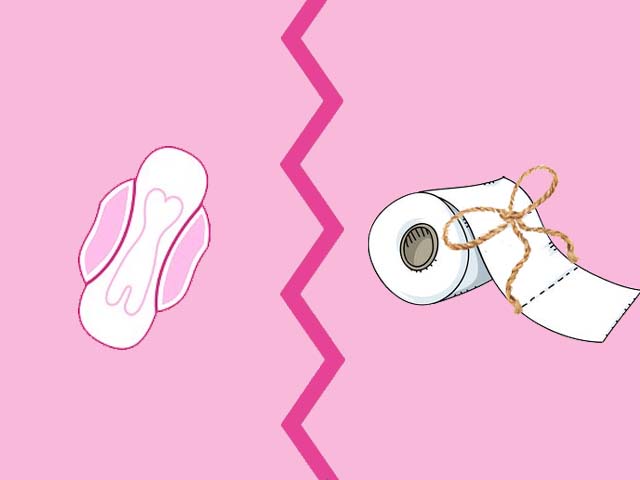
I was traumatised. What if the toilet paper slipped out of my pants?
Twines and toilet paper will not do: Sanitary supplies should be a necessity, not a luxury
I couldn’t sit, I couldn’t stand and I couldn’t climb the stairs to get on the bus to get back home.
I was studying at a public school and was in grade 11 when it happened. One day. I went to school without any underwear on and I got my period.
Studying at one of the largest government colleges for girls in Islamabad, you would think that they would be able to help you in a situation like this. However, their ‘help’ came in the form of offering me a piece of twine and a toilet paper roll. They suggested that I fold in the toilet paper and the twine would hold it in.
That was just one day of menstruation in my 16 years of life and to this day, I’m still appalled when I think about it. I was simply traumatised. What if the toilet paper slipped out of my pants? What is someone saw? I couldn’t sit, I couldn’t stand and I couldn’t climb the stairs to get on the bus to get back home.
I am one of the few privileged young women in Islamabad who have access to all the sanitary and hygiene supplies available in the supermarket. However, 79% of girls in Pakistan do not have these luxuries available to them. Sanitary supplies should be a necessity, not a luxury.
They aren’t able to manage their menstruation hygienically, which causes severe psychological and gynaecological problems. And you know what else? In Pakistan, a significant number of girls actually drop out of schools since no proper menstrual hygiene management facilities are available at schools. They drop out and they don’t return to finish their education only because they belong to a group of two billion girls worldwide for whom mensuration is a monthly reality, not a choice they make.
That’s when the natural demand of a body that procreates is treated as unnatural and untouchable.
Twenty-five million people in Pakistan do not have access to clean and safe toilets leading them to defecate in the open with no dignity or privacy, and thus, are more vulnerable (in the case of menstruating women) to disease and infection. Where they are available, there is no clean water and there is no way to clean up or discreetly dispose of used rags or leaves. On top of this, these women are made to feel ashamed of their bodies and made to think that they are these unclean lepers who must be excluded from various social activities such as cooking and playing.
As dismal the situation may be, a lot of work is being done to counter this situation in Pakistan by various local and international organisations, but is it enough? I don’t think so. There is so much work to be done at so many levels, from changing the mind-set and busting taboos around menstruation to a provision of actual facilities that help convenient menstruation hygiene.
Arunachalam Muruganantham hailed from a poor family, but he rose to the status of Menstrual Hygiene Management hero in India when he revolutionised menstrual health for rural women by inventing a simple machine that could make cheap sanitary pads. His invention is now being used widely in India since it has such a low cost.
A number of similar cheap and inventive products are being designed in other developing countries as well, for which international agencies provide tremendous financial and technical support. Some of these opportunities do exist in Pakistan. For example, there was the menstrual hygiene innovation challenge (MHM) going around on Facebook which was looking for innovative tools, models and services.
The challenge was open to males and females all over the country. Opportunities like this are frequently available but they just need more awareness campaigns. However, the issue is that various young people are just not interested in them and thus, they do not garner the attention and support they require.
We need to help enable millions of girls across Pakistan to be more aware, confident and hygienic. It’s time to stop hiding behind the socially constructed walls of gender and accept our bodies. In a society where natural functions are not easily accepted, we need to push even harder for our girls to be educated when it comes to menstruation. Twines and toilet paper will not do and I refuse to believe that they ever will.

COMMENTS (4)
Comments are moderated and generally will be posted if they are on-topic and not abusive.
For more information, please see our Comments FAQ